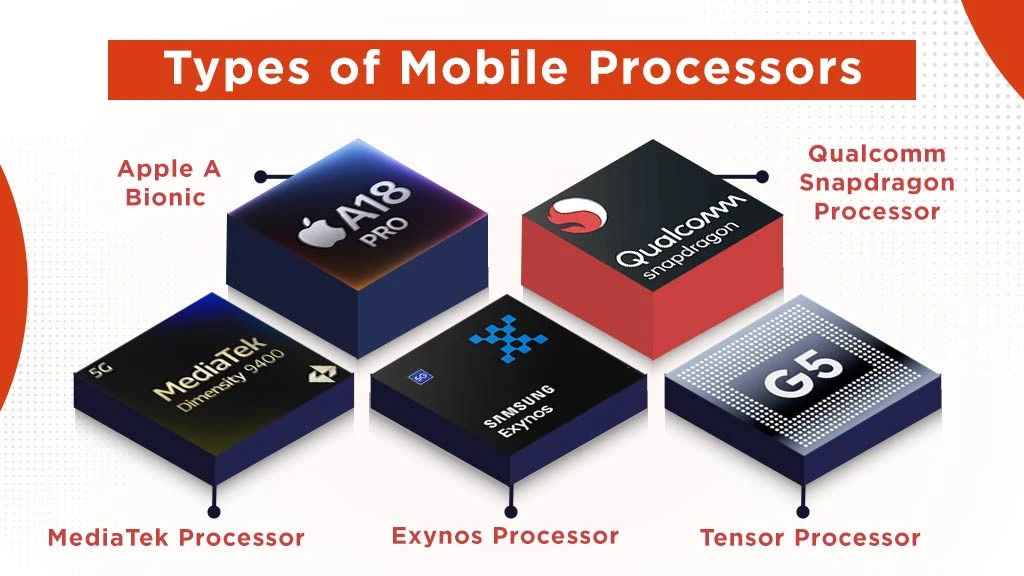Understanding Different Types of Mobile Processors

You must have wondered why two phones with the same price and the same RAM can function at different speeds. The secret of this lies beneath the mobile screen. Yes, it's a mobile processor. But do you know that processors have their own types and specific components that are responsible for a phone's faster performance?
So, let us dive deep into it and understand their types and components, gaining a detailed understanding of mobile processors.
Table of Contents
- What Is Processor in Mobile Phones?
- What is the Use of Processor and How Does it Work?
- Types of Android Mobile Processors
- Best Processor for Android Mobiles
- Conclusion
What Is Processor in Mobile Phones?
A mobile processor known as a system-on-chip (SoC) is a single chip that controls everything a phone does, from opening an app to launching games and videos. Everything your phone performs is powered by its processor. Unlike computers, mobile processors combine the CPU, GPU, and MODEM all into one compact chip that helps in performing multiple tasks with optimal power consumption.
The mobile CPU acts as the core part of the processor that handles the main calculations and instructions. Mobile CPUs usually have multiple cores, like 4,6, or 8, and each core handles different tasks. Thus, the higher the core capacity, the better the multitasking capability of the phone.
Units Working Together:
- CPU: Controls tasks and calculations
- GPU: Handles visuals, animations, and games
- AI ENGINE: AI-powered voice assistants and photo enhancements
- ISP: Image Signal Processor processes camera images
- MODEM: Enable network connectivity
What is the Use of Processor and How Does it Work?
A mobile processor ensures smooth multitasking and optimal power use.
The following are its key uses:
- Runs apps and games: From basic app use to high-end gaming.
- Controls connectivity: Manages 5G, Wi-Fi, Bluetooth, and network stability.
- Enhances camera performance: Processes images, videos, and AI enhancements.
- Optimizes battery usage: Ensures power optimization.
A mobile processor works on the principles of computation. It receives, decodes, and executes instructions. It follows three easy steps:
- Receiving the Command
- Processing the Request
- Delivering the Result
Types of Mobile Processors

There's a wide variety of processors available to support mobile phone performance. Different companies with unique design philosophies manufacture these chipsets. Each chipset has its own strengths and limitations, so understanding the differences makes it easier to choose a phone that fits your needs. Below, you can find the most popular mobile processors with their core specs.
Apple A-Series Chips
Apple first introduced its fully customised in-house mobile processor, the A4, in 2010, and over the years, it has pushed the boundaries of speed, efficiency, and power optimisation. Now, the chips are known for powering the most advanced technologies in the iPhone, from computational photography to AI-powered features. Apple has evolved its chipsets not just by increasing raw power but by perfectly blending them with the tightly controlled Apple ecosystem. Now that we've set up the foundation, we can learn about their core specs and what makes Apple's A series stand out.
- CPU Architecture: Apple devices are equipped with custom ARM-based architectures, with each core designed by Apple. Apple uses a hybrid core setup-
- Performance core: These are the large cores known for delivering desktop-class performance in smartphones and are used for demanding tasks such as gaming, editing, and AI workloads.
- Efficiency core: Small cores are used for everyday tasks like simple browsing, texting, and light apps.
- Graphics: The Apple A series comes with custom-designed GPUs with 3-6 cores that support advanced features like tile-based deferred rendering, integration with the Metal API, and help in maintaining higher frame rates.
- Neural Engine: A specialized processor that ensures the optimal functioning of AI-powered features and machine learning tasks while ensuring power savings. Features like Siri voice commands, face recognition, camera enhancements, etc., receive support from the Neural Engine.
Qualcomm Snapdragon Processor
When it comes to performance in Android smartphones, Qualcomm Snapdragon processors dominate. Snapdragon mobile processors are considered the most reliable mobile chipsets. They are equipped with Adreno GPUs and built-in AI engines that ensure ultra gaming performance and smooth multitasking.
- Performance and Architecture: Snapdragon mobile processors are built on advanced 4nm and 3nm architectures that improve performance as smaller manufacturing nodes pack more transistors into the same space.
- Graphics: Integration of Adreno GPU ensures top-quality visuals and smooth gameplay.
- AI Integration: Snapdragon’s AI Engine improves photography and assists in voice recognition and system optimization.
- Thermal Management: These processors remain cool even during heavy usage, which helps in longer gaming sessions.
- Battery Optimization: These processors are designed to optimize power usage without compromising performance.
MediaTek Processor
MediaTek processors are known for offering powerful performance at affordable prices. These processors stand on innovation in AI and efficiency.
- Balanced Performance: Premium-level performance with optimal power usage.
- AI and Imaging: Camera functions, real-time image processing, and voice recognition are enhanced with the help of the APU (AI Processing Unit).
- Gaming Capabilities: HyperEngine technology improves gaming graphics with less response time, making it one of the best processors for gaming on Android phones.
- Efficiency and Battery Life: Built on 4nm or 6nm process nodes, they ensure better power optimization without compromising speed.
- Affordable Innovation: Compared to other brands, MediaTek offers top-tier features at a lower mobile processor price.
Exynos Processor
Samsung developed these processors to power many of its flagship and mid-range phones, which are designed for optimized performance, AI efficiency, and seamless integration within the Samsung ecosystem.
- Balanced Power: It’s achieved through a hybrid CPU architecture (high-performance + efficiency cores) that delivers fast performance for heavy tasks while saving battery during light tasks.
- Integrated GPU: The built-in GPU handles graphics rendering for apps and games, providing crisp visuals, smooth animations, and better gaming performance without needing a separate graphics chip.
- AI Intelligence: Dedicated AI/ML hardware (like Edge TPU in Google Tensor) boosts camera features, improves voice recognition, and enables real-time smart features, making the device “intelligent” in handling tasks.
- Thermal Efficiency: Optimized CPU/GPU design along with power management ensures lower heat generation and balanced performance.
- 5G Connectivity: Integrated 5G modem allows faster download/upload speeds, low latency, and stable connections, supporting modern apps, streaming, and cloud services efficiently.
Tensor Processor
Google started developing tensor processing units in 2015, but their first SoC, Google Tensor, launched in October 2021 with the Pixel 6. Google Tensor comes with one unique feature: its offline Google Assistant and real-time voice typing without the internet, as they have built it around their own machine learning model, which allows them to support such features. Let's now find out the key features and how it influences performance.
- CPU Architecture: It has a hybrid big.LITTLE setup with 8 cores:
- 2 Prime Cortex-X1 cores (2.8 GHz)
- 2 Performance Cortex-A76 cores (2.25 GHz)
- 4 Efficiency Cortex-A55 cores (1.8 GHz)
- AI/ML Hardware: Google designed (Edge TPU) a dedicated hardware that speeds up ai processing and have the capability of 1.6 TOPS, enabling machine learning task to run seamlessly.
- GPU Specs: ARM Mali-G78 GPU
- 20 execution units: Parallel “workers” that improves graphics processing.
- 320 shader units: Handle pixels, colors, textures, lighting, and visual effects.
- Clock speed 760 MHz: Determines how fast the GPU processes graphics.
- Memory: Supports up to 12GB LPDDR5-5500 memory across 2 channels for high-speed performance.
Best Processor for Android Mobiles
In the race of the best and top-performing processors, there are several names that always top the list. However, there is no hard and fast rule that you should only pick the one that tops the list, because your usability defines what matters. Below, check the top -performing processors, their details, and then go ahead with the one that perfectly caters to your needs.
Top Choices in 2026:
- Snapdragon 8 Gen 3 / 8 Elite
- MediaTek Dimensity 9400
- Samsung Exynos 2400
- Google Tensor G3
Conclusion
When choosing a smartphone, it is always important to understand the processor used in the phone, as it is the brain of the phone and determines its performance and efficiency. Throughout the blog, we focus on each processor type, its roles, and how it improves performance. All this makes you informed enough to take your call. But the processor is just one factor among many when selecting a phone, so when you're making a smartphone choice, try to learn about and understand other essential aspects, then evaluate them to invest in a phone with a capable processor to keep it running smoothly.
Frequently Asked Questions On Understanding Different Types of Mobile Processors
1. How to understand a mobile processor?
Mobile processors can be understood as the brain of your phone that decides the speed at which a task runs, the smoothness of a game's play, and power consumption.
2. How many types of processors are in mobile phones?
There are different types of mobile processors present. However most popular mobile processors are Qualcomm Snapdragon, MediaTek, and Tensor processors.
3. What are the 5 types of processors?
Processors come in multiple types, but the most popular mobile processors are Snapdragon, MediaTek (Dimensity), Samsung Exynos, Apple Bionic, and Google Tensor.
4. How many GHz is a good processor speed for mobile?
Most smartphones with CPU clock speeds between 2.0 and 3.0 GHz are considered ideal.
5. Is a 2.2 GHz processor speed good for mobile devices?
Yes, 2.2 GHz speed is optimum for regular tasks and moderate performance needs.
6. What does a 2.5 GHz processor mean?
It means the chip can run 2.5 billion cycles per second, which affects how fast it processes data.
7. How to check if a phone is Snapdragon or Exynos?
Open Settings, then locate the phone model and "chipset" to find the processor.
8. What is the latest 5G processor?
The latest 5G processors are Qualcomm’s Snapdragon 8 Elite Gen 5 and MediaTek's Dimensity 9500.


Related Blogs












